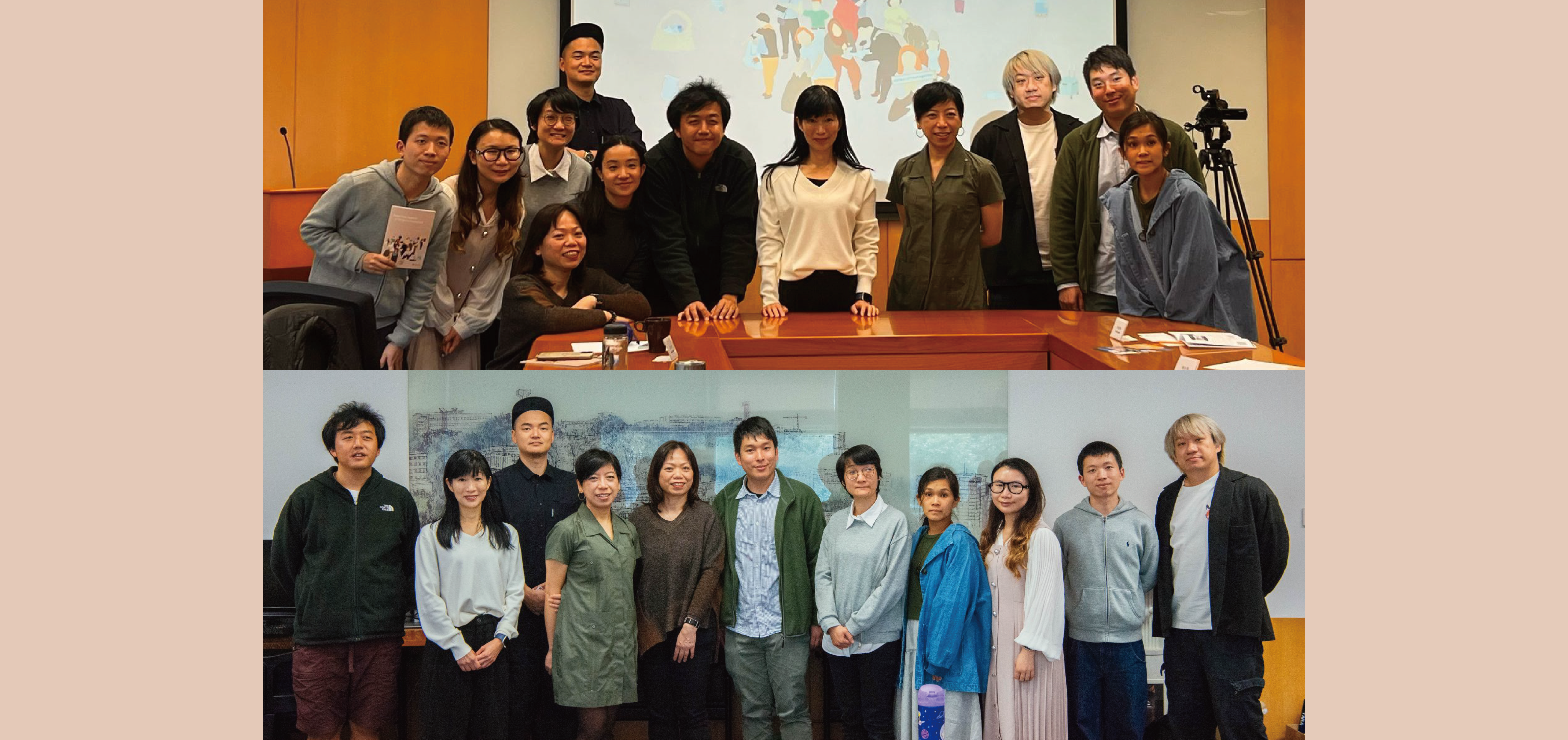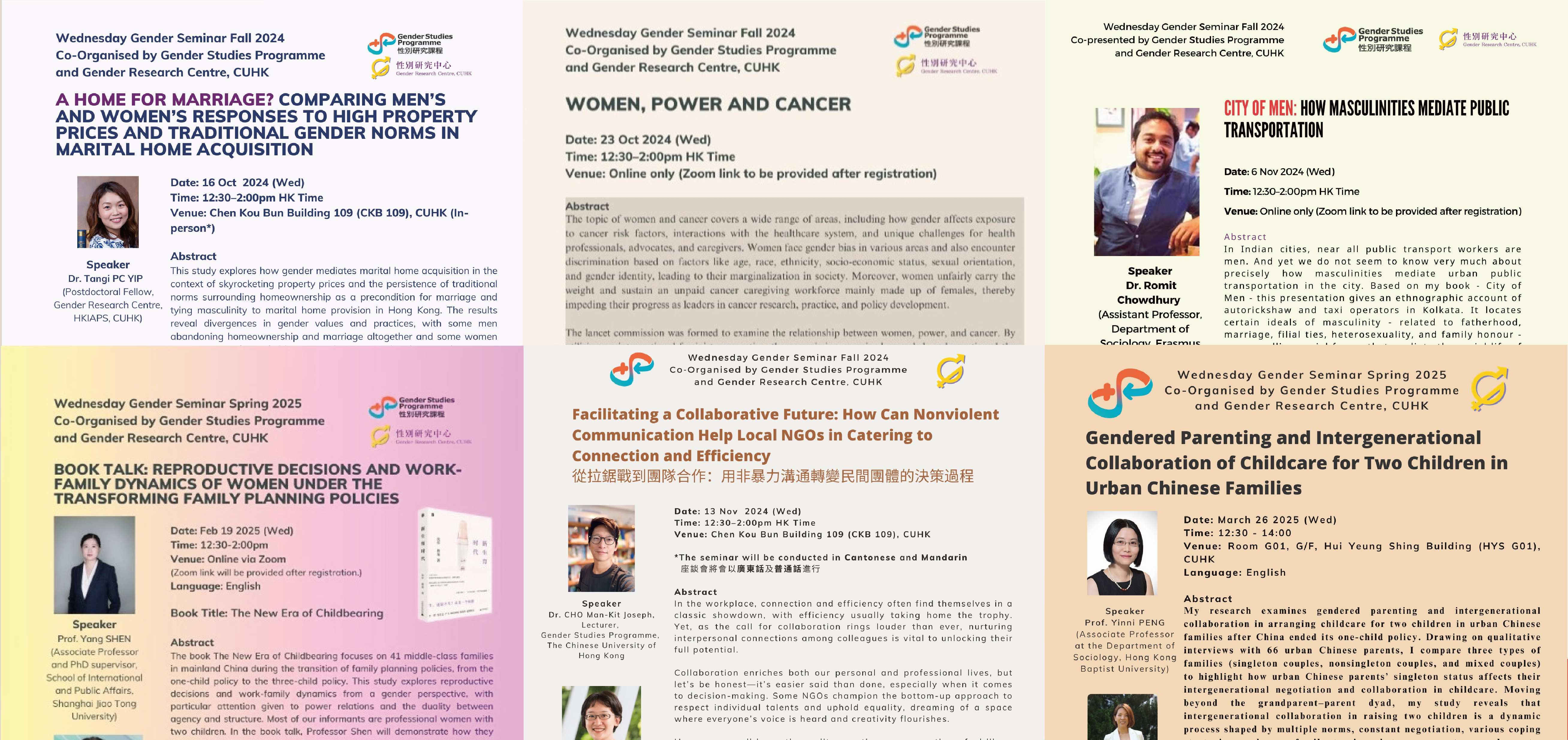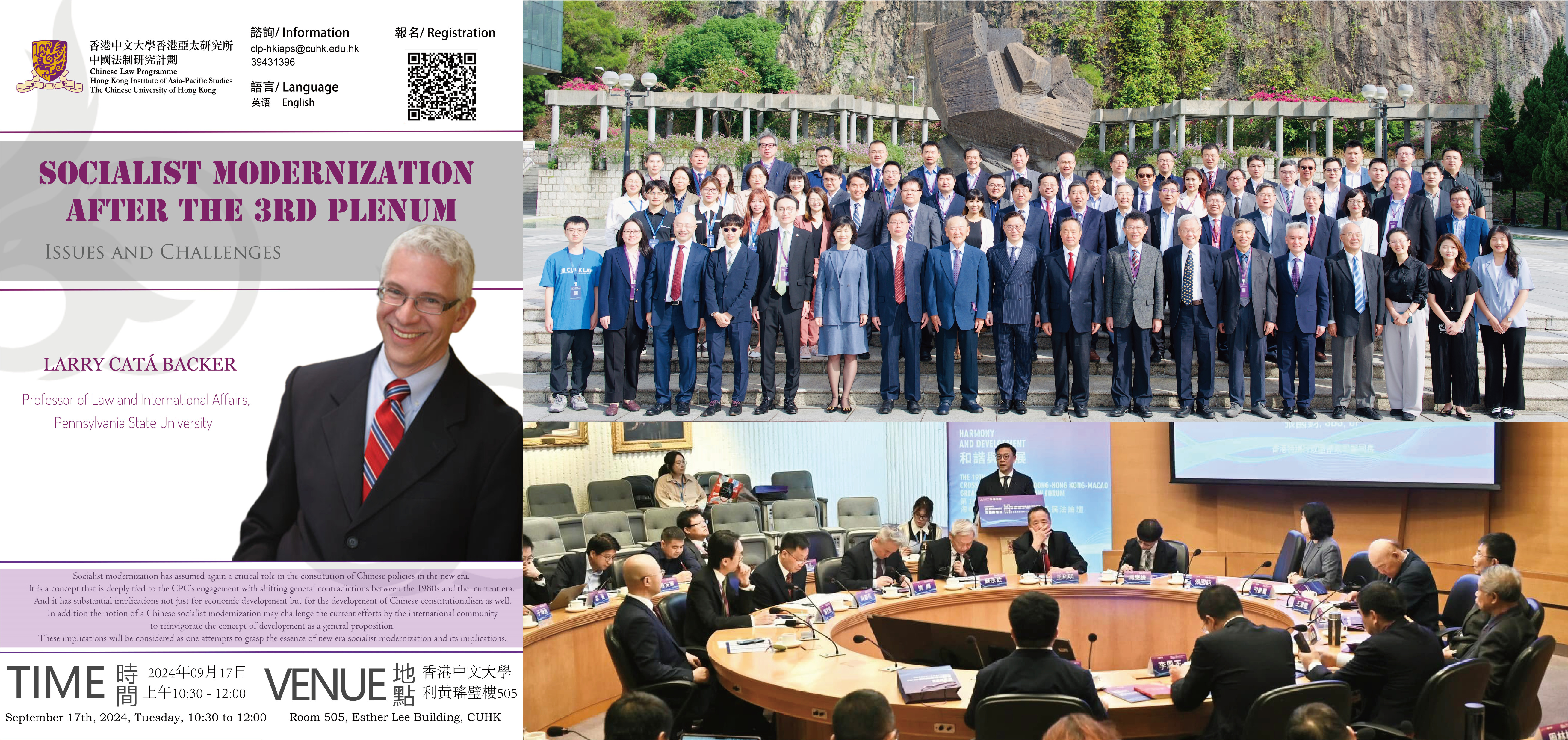
|
| Seminars and Others |
|
|
| Hong Kong Institute of Asia-Pacific Studies |
Centre for Chinese Family Studies |
Centre for Social Innovation Studies |
Centre for Urban Innovations |
| Gender Research Centre | Research Centre for Urban and Regional Development |
Chinese Law Programme |
|
Hong Kong Institute of Asia-Pacific Studies
HKIAPS Noon Lecture Series: Riding the Waves – Ningbo Merchants in the Context of the Belt and Road Initiative (香港亞太研究所中午大講座—踏浪出海:「一帶一路」視域下的寧波商人) 12:00–13:30 | 31 March 2025 | Room 505, 5/F, Esther Lee Building, The Chinese University of Hong Kong & Online |
|
|
Speaker
Prof. Jian Li |
Professor, School of Marxism, Shanghai University, China
|
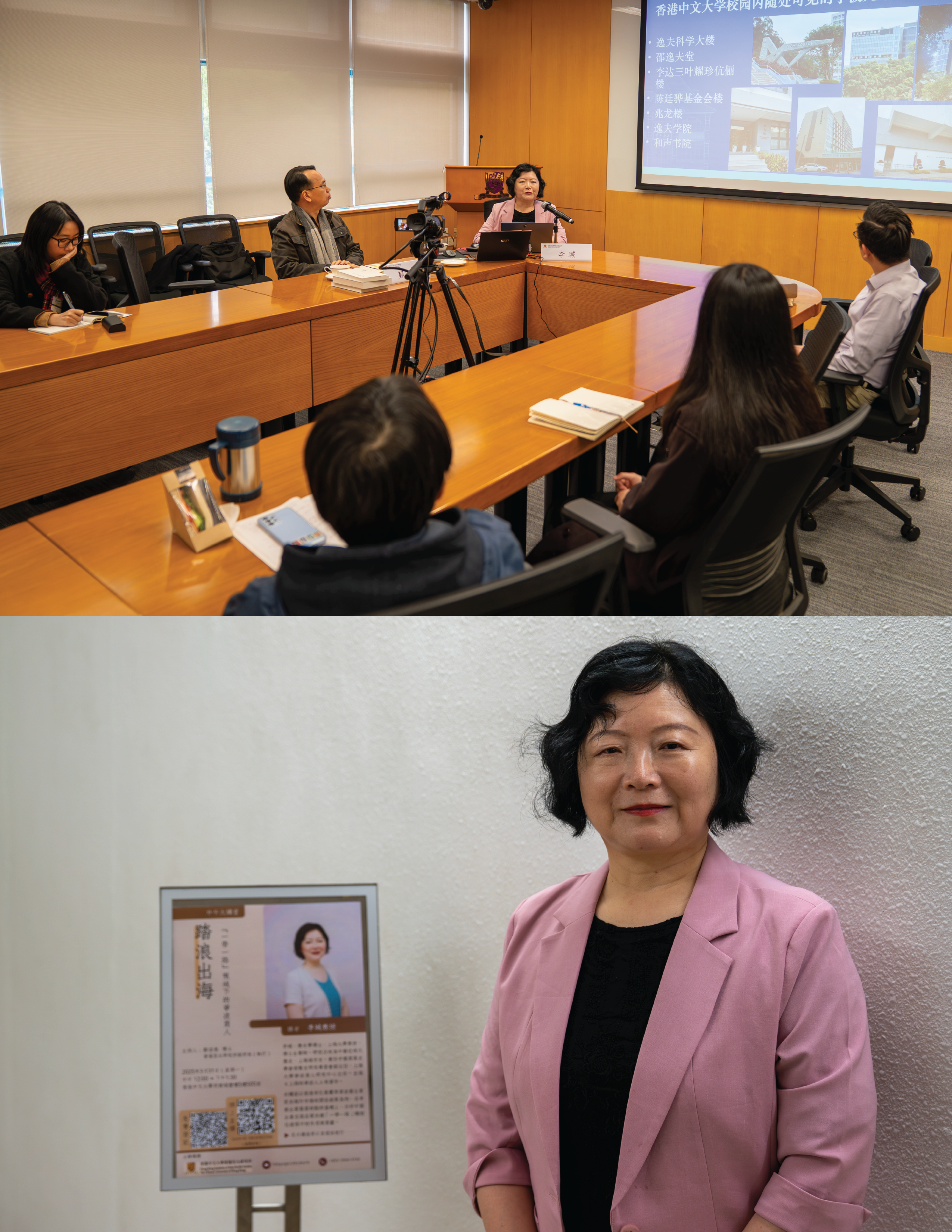 In this seminar, Prof. Li discussed three characteristics of Ningbo entrepreneurs.
To begin with, she stated that Ningbo merchants are a unique phenomenon.
The “Ningbo Gang” is distinguished by its regional and cultural traits,
and attracted attention in different historical periods.
For example, some buildings in the CUHK campus were named after Ningbo merchants,
including Sir Run Run Shaw, Li Dak Sum, Lee Woo-sing, and others.
The study of Ningbo merchants is a global academic topic,
transcending regional boundaries to become a symbol in Chinese commercial history.
In this seminar, Prof. Li discussed three characteristics of Ningbo entrepreneurs.
To begin with, she stated that Ningbo merchants are a unique phenomenon.
The “Ningbo Gang” is distinguished by its regional and cultural traits,
and attracted attention in different historical periods.
For example, some buildings in the CUHK campus were named after Ningbo merchants,
including Sir Run Run Shaw, Li Dak Sum, Lee Woo-sing, and others.
The study of Ningbo merchants is a global academic topic,
transcending regional boundaries to become a symbol in Chinese commercial history.Another characteristic of Ningbo entrepreneurs is their strong organizational and cohesive power. This cohesion enabled them to evolve into a merchant group that integrated activities in the areas of trade, finance, shipping, and industry. Their investments in modern national industries propelled China’s economic modernization and urbanization, marking their successful transition from a traditional merchant group to a modern one. Thus, when speaking of "Ningbo merchants", the reference is not only to their economic prowess but also to their rich social and cultural heritage. Their contributions to Shanghai’s rise as a multifunctional economic centre, particularly in commerce and finance, are well-documented. Last, but not least, Ningbo entrepreneurs thrived in maritime trade, where they carved out a unique historical path. As a key port on the Maritime Silk Road, Ningbo was a hub for cultural exchanges. The challenging life on this coastal outpost fostered traits such as courage, resilience, diligence, and cooperation, shaping their adventurous and enterprising image. In the second part of the seminar, Prof. Li examined the Lee Group’s pioneering ventures in Nigeria and its expansion in African markets to assess the role and contributions of Chinese companies in the institutionalized advancement of high-quality Belt and Road cooperation. The Group was founded by Ningbo entrepreneur Kwan-dai Lee, and his family is one of the “Big Four” Chinese families in Nigeria. In recent years, the Lee Group has actively adapted to global economic trends, leveraging the robust economic strength and social resources of Nigeria and West Africa in general. The Group is engaged in multiple large-scale projects, including the construction of an international industrial park, power plants, and others. Prof. Li concluded the seminar by stating that Hong Kong should adopt an expansive vision for development, pave the way for international collaboration with neighbouring regions, and learn to comply with market needs. Around 70 participants joined in person and online. |
|
|
Centre for Chinese Family Studies
Tracking Effect or Selection Effect? Vocational Education and Status Attainment in China 09:30–11:00 | 30 October 2024 | Online |
|
|
Speaker
Prof. Duoduo Xu |
Assistant Professor, Department of Sociology, the University of Hong Kong
|
|
Co-organizer
Faculty of Social Science, CUHK |
|
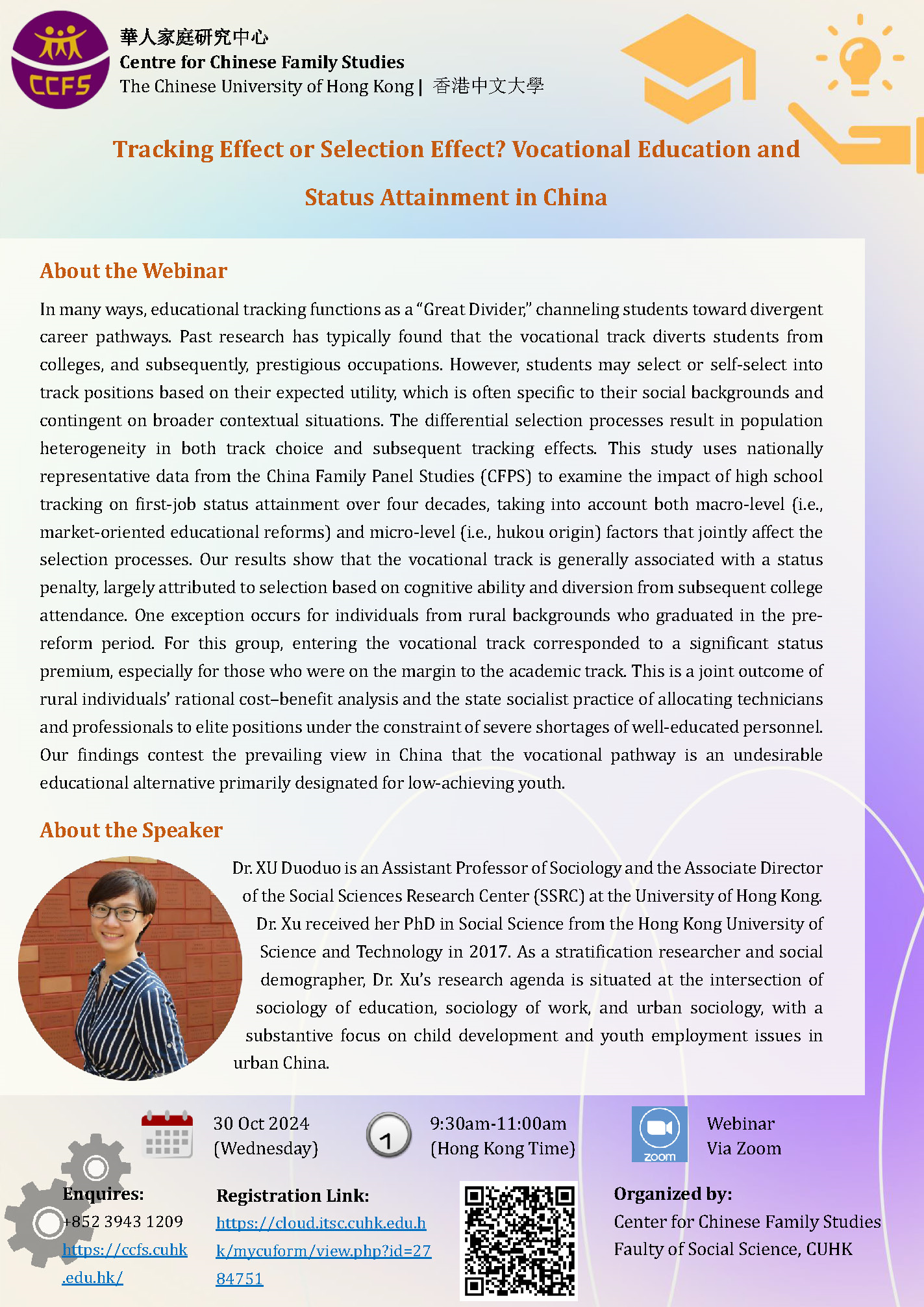 In many ways, educational tracking functions as a “Great Divider”,
channelling students toward divergent career pathways.
Past research has typically found that the vocational track diverts students from colleges and, subsequently,
from prestigious occupations.
However, students may select or self-select into track positions based on their expected utility,
which is often specific to their social background and contingent on broader contextual situations.
The differential selection processes result in population heterogeneity in both choice of track and the subsequent effects of tracking.
In many ways, educational tracking functions as a “Great Divider”,
channelling students toward divergent career pathways.
Past research has typically found that the vocational track diverts students from colleges and, subsequently,
from prestigious occupations.
However, students may select or self-select into track positions based on their expected utility,
which is often specific to their social background and contingent on broader contextual situations.
The differential selection processes result in population heterogeneity in both choice of track and the subsequent effects of tracking. In this seminar, Prof. Xu unveiled her study, in which she used nationally representative data from the China Family Panel Studies (CFPS) to examine the impact of high school tracking on first-job status attainment over four decades, taking into account both macro-level (i.e., market-oriented educational reforms) and micro-level (i.e., hukou origin) factors that jointly affect the selection processes. The results showed that the vocational track is generally associated with a status penalty, which is largely attributed to selection based on cognitive ability and diversion from subsequent college attendance. The one exception was for individuals from rural backgrounds who graduated in the pre-reform period. For this group, entering the vocational track corresponded to a significant status premium, especially for those who were on the margins of the academic track. This was the joint outcome of a rational cost–benefits analysis by rural individuals and the state’s socialist practice of allocating technicians and professionals to elite positions under the constraint of severe shortages of well-educated personnel. Research findings contest the prevailing view in China that the vocational pathway is an undesirable educational alternative primarily designated for low-achieving youth. |
|
|
Localization of Research in Population Ageing: Examples from Singapore
14:30–16:00 | 25 November 2024 | Rm 422, Sino Building, Chung Chi College, CUHK |
|
|
Speaker
Prof. Qiushi Feng |
Associate Professor, Department of Sociology and Anthropology, National University of Singapore |
|
Co-organizer
Department of Sociology, CUHK |
|
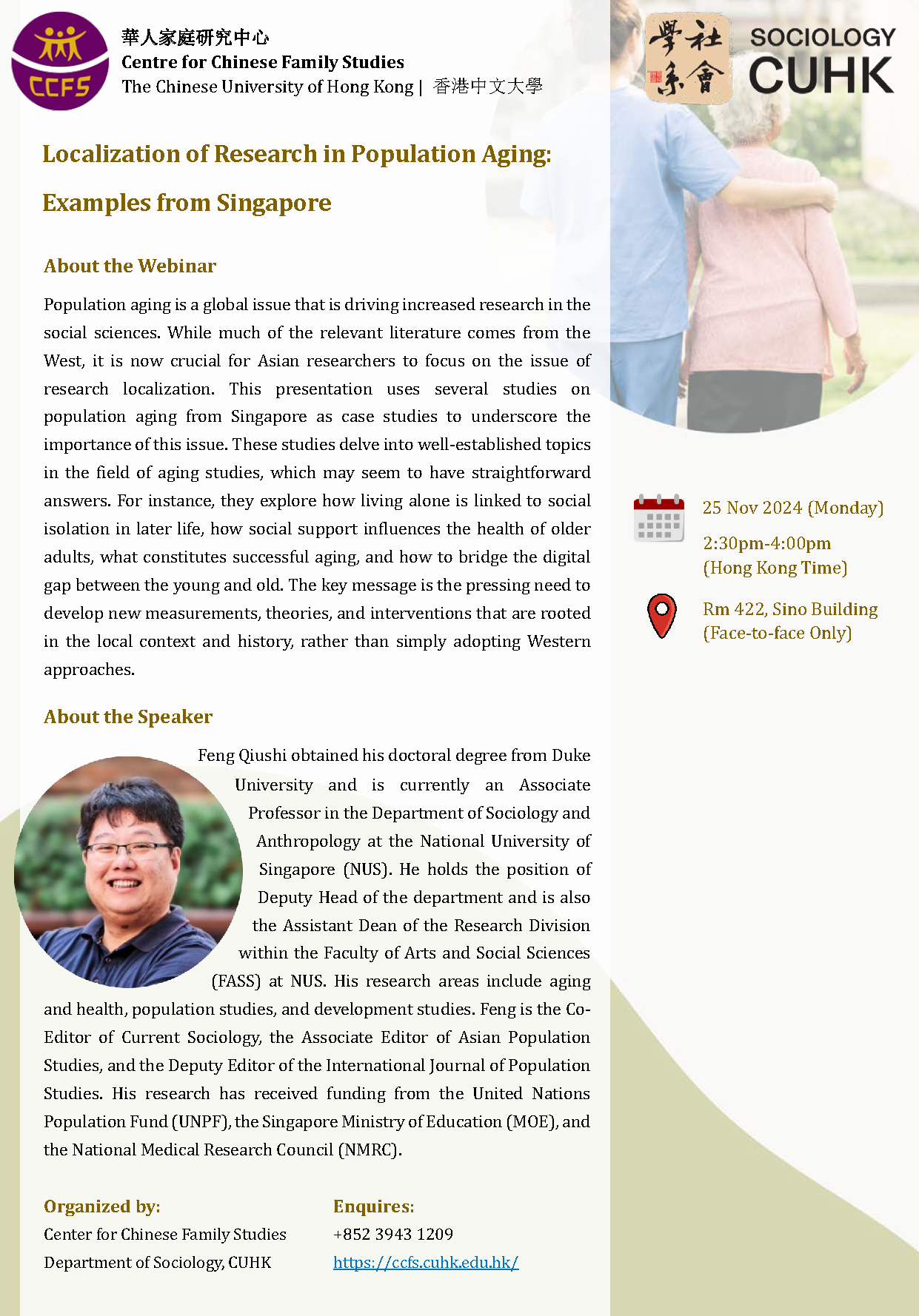 Population ageing is a global issue that is driving increased research in the social sciences.
While much of the relevant literature comes from the West,
it is now crucial for Asian researchers to focus on the issue of research localization.
This presentation uses several studies on population ageing from Singapore as case studies to underscore the importance of this issue.
These studies delve into well-established topics in the field of ageing studies,
which may seem to have straightforward answers.
For instance, they explore how living alone is linked to social isolation in later life, how social support influences the health of older adults,
what constitutes successful ageing, and how to bridge the digital gap between the young and old.
Population ageing is a global issue that is driving increased research in the social sciences.
While much of the relevant literature comes from the West,
it is now crucial for Asian researchers to focus on the issue of research localization.
This presentation uses several studies on population ageing from Singapore as case studies to underscore the importance of this issue.
These studies delve into well-established topics in the field of ageing studies,
which may seem to have straightforward answers.
For instance, they explore how living alone is linked to social isolation in later life, how social support influences the health of older adults,
what constitutes successful ageing, and how to bridge the digital gap between the young and old. The key message is the pressing need to develop new measurements, theories, and interventions that are rooted in local contexts and histories, rather than simply adopting Western approaches. |
|
|
Reinstitutionalization of Marriage among Young People in Taiwan
09:30–11:00 | 28 February 2025 | Online |
|
|
Speaker
Prof. Lake Lui |
Associate Professor, Department of Sociology, University of Taiwan
|
|
Co-organizer
Faculty of Social Science, CUHK |
|
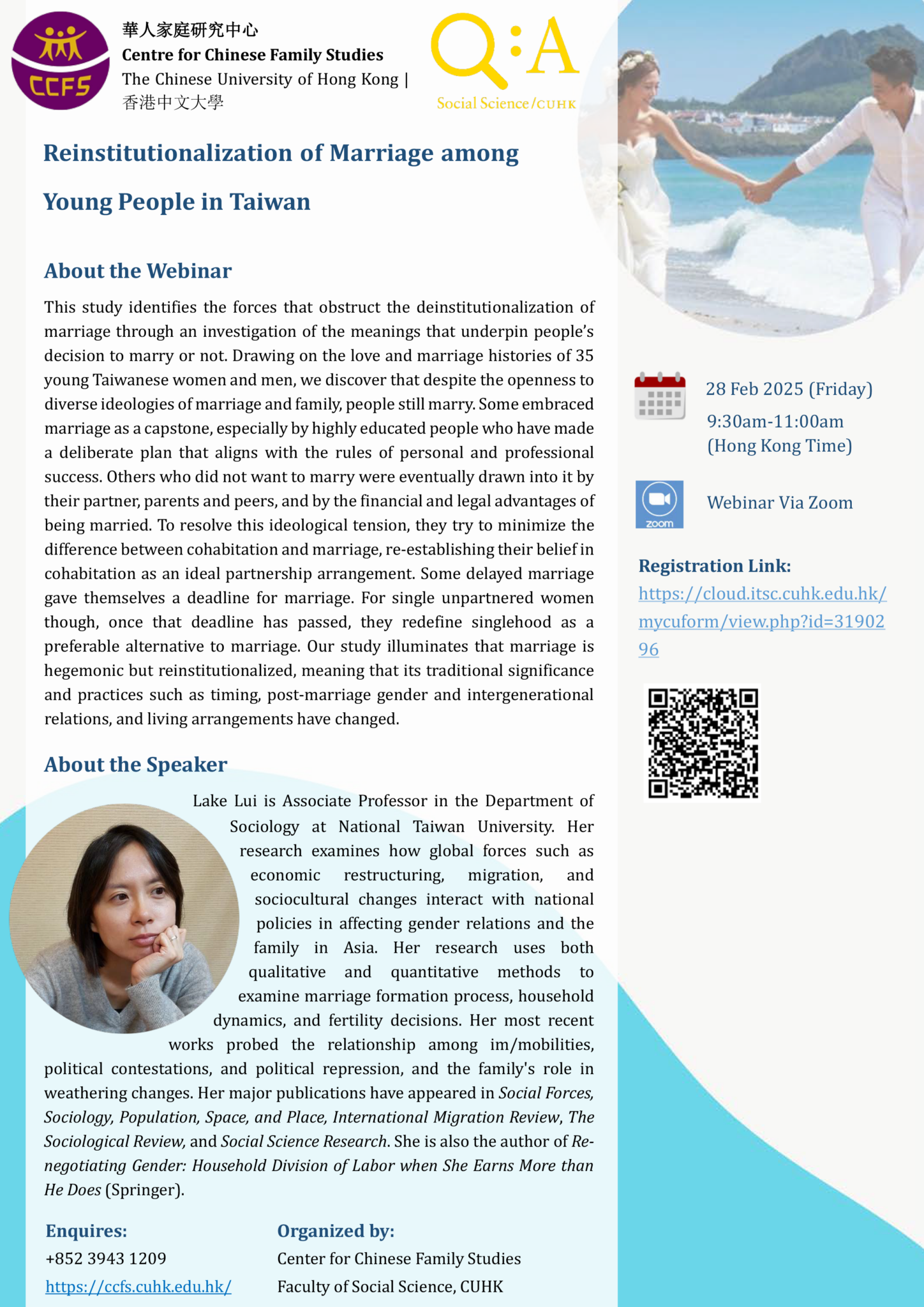 This seminar identifies the forces that obstruct the deinstitutionalization of marriage through an investigation of the meanings that underpin people’s decision to marry or not.
Drawing on the love and marriage histories of 35 young Taiwanese women and men,
Prof. Lui and her team discovered that despite openness to diverse ideologies of marriage and family, people still marry.
Some embraced marriage as a capstone,
especially highly educated people who have made a deliberate plan that aligns with the rules of personal and professional success.
Others who did not want to marry were eventually drawn into marriage by their partner, parents, and peers,
and by the financial and legal advantages of being married. To resolve this ideological tension,
they tried to minimize the difference between cohabitation and marriage,
re-establishing their belief in cohabitation as an ideal partnership arrangement.
Some who delayed marriage gave themselves a deadline to marry.
Once that deadline passed, however,
single unpartnered women redefined singlehood as a preferable alternative to marriage.
This seminar identifies the forces that obstruct the deinstitutionalization of marriage through an investigation of the meanings that underpin people’s decision to marry or not.
Drawing on the love and marriage histories of 35 young Taiwanese women and men,
Prof. Lui and her team discovered that despite openness to diverse ideologies of marriage and family, people still marry.
Some embraced marriage as a capstone,
especially highly educated people who have made a deliberate plan that aligns with the rules of personal and professional success.
Others who did not want to marry were eventually drawn into marriage by their partner, parents, and peers,
and by the financial and legal advantages of being married. To resolve this ideological tension,
they tried to minimize the difference between cohabitation and marriage,
re-establishing their belief in cohabitation as an ideal partnership arrangement.
Some who delayed marriage gave themselves a deadline to marry.
Once that deadline passed, however,
single unpartnered women redefined singlehood as a preferable alternative to marriage. The study sheds light on marriage as hegemonic but reinstitutionalized, meaning that its traditional significance and practices (such as timing, post-marriage gender and intergenerational relations, and living arrangements) have changed. |
|
|
Centre for Social Innovation Studies
Roundtable: Migrant Domestic helpers practicing waste reduction for Hong Kong (圓桌會議:減廢香港·工人姐姐點幫手) 14:00–17:00 | 21 February 2025 | Room 505, 5/F, Esther Lee Building, CUHK |
|
|
Co-organizer
CUHK Jockey Club Museum of Climate Change |
|
|
Sponsors
Environment and Conservation Fund, HKSAR Government HKIAPS |
|
 A roundtable discussion on “Migrant domestic helpers practising waste reduction for Hong Kong” was organized to explore the experiences and challenges involved in promoting waste reduction and environmental protection initiatives among the migrant domestic helper community.
The CSIS hopes to bring together activists, academics, migrant domestic helper rights groups,
and NGOs in the community to promote environmental practices among migrant domestic helpers.
Stakeholders shared the practical difficulties and their successes in promoting waste reduction among migrant domestic helpers,
and drew upon collective wisdom to add friendly elements to the existing community policies on waste reduction and recycling.
The organizations that shared their experiences included:
A roundtable discussion on “Migrant domestic helpers practising waste reduction for Hong Kong” was organized to explore the experiences and challenges involved in promoting waste reduction and environmental protection initiatives among the migrant domestic helper community.
The CSIS hopes to bring together activists, academics, migrant domestic helper rights groups,
and NGOs in the community to promote environmental practices among migrant domestic helpers.
Stakeholders shared the practical difficulties and their successes in promoting waste reduction among migrant domestic helpers,
and drew upon collective wisdom to add friendly elements to the existing community policies on waste reduction and recycling.
The organizations that shared their experiences included:* Caritas Asia Migrant Workers Social Service Programme * Community for Sustainable Development * Diocesan Commission for Integral Human Development * Mission for Migrant Workers Through this conference, the participants shared the experiences and challenges that they faced in promoting waste reduction and environmental protection among migrant domestic helpers. They were able to listen to the views of academics, the community, and other organizations on waste reduction and environmental protection; on addressing difficulties in current practices, and on providing a platform for promoting the welfare of migrant domestic helpers. It is hoped that this conference inspired innovative ideas in planning to implement the policy on promoting inclusive and migrant domestic helper-friendly environmental protection work. |
|
|
Centre for Urban Innovations
Overview of “Agricultural Priority Areas” Policy Seminar 14:00–17:30 | 8 February 2025 | LT1, Esther Lee Building, CUHK |
|
|
Guest Speakers
Prof. Fan-chung Wong |
Director, Hong Kong Organic Resource Centre |
|
Mr Tsz-lam Ip
|
Manager, Regenerative Agriculture Department, Kadoorie Farm and Botanic Garden |
|
Panellists (Environmental and Professional Sectors)
Dr Yin-lun Chan |
Hong Kong Institute of Landscape Architects |
|
Dr Pui-lok Chan
|
World Wide Fund for Nature (WWF) Hong Kong
|
|
Mr Hei-man Ng
|
The Conservancy Association
|
|
Ms Ming-chuen Wu
|
Hong Kong Bird Watching Society
|
|
Mr Kin-wan Yeung
|
Kadoorie Farm and Botanic Garden
|
|
Mr Kin-ching Chan
|
Liber Research Community
|
|
Panellists (Agricultural Sector)
Pastor Lam-hon Law |
Hong Kong Organic Living Association |
|
Ms Wah-fong Wong
|
Lan Mui Organic Farm (Wong Nai Tun)
|
|
Mr Kwok-sang Law
|
Yuelai Farm (Chuen Lung)
|
|
Mr Lin-cheong Yuen
|
Hong Miu Organic Farm (Tai Kong Po)
|
|
Mr Wan-lung Lee
|
New Zealand Organic Farm (Lam Tsuen)
|
|
Co-organizers
Kadoorie Farm and Botanic Garden Liber Research Community WWF-Hong Kong The Conservancy Association |
|
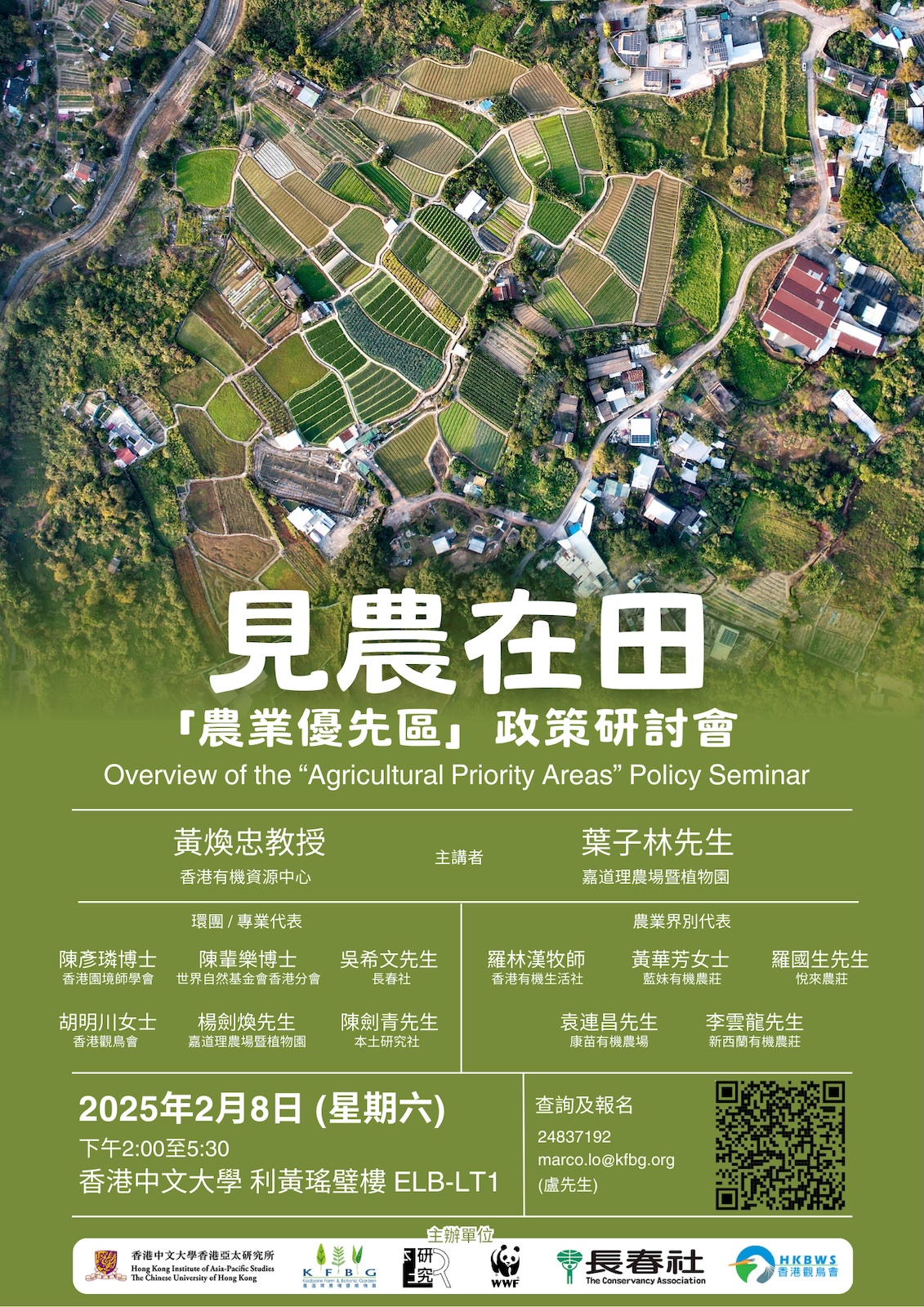 In December 2024, the Hong Kong government released a policy consultation document titled “Agriculture Priority Areas”.
In response to this initiative,
Kadoorie Farm and Botanic Garden collaborated with several organizations—including the Centre for Urban Innovations (Hong Kong Institute of Asia-Pacific Studies, CUHK),
the Liber Research Community, WWF-Hong Kong, the Conservancy Association,
and the Hong Kong Bird Watching Society—to co-host a seminar on 8 February 2025 titled “Overview of the Agricultural Priority Areas Policy”.
In December 2024, the Hong Kong government released a policy consultation document titled “Agriculture Priority Areas”.
In response to this initiative,
Kadoorie Farm and Botanic Garden collaborated with several organizations—including the Centre for Urban Innovations (Hong Kong Institute of Asia-Pacific Studies, CUHK),
the Liber Research Community, WWF-Hong Kong, the Conservancy Association,
and the Hong Kong Bird Watching Society—to co-host a seminar on 8 February 2025 titled “Overview of the Agricultural Priority Areas Policy”.The seminar attracted approximately 200 attendees, who responded with great enthusiasm. Speakers represented a diverse range of sectors, including farmers, agricultural organizations, environmental groups, and professionals. They shared valuable insights and perspectives on the Agricultural Priority Areas issue. It is hoped that the government will take these views into account to gain a deeper understanding of the concerns of stakeholders and formulate agricultural development strategies that align with sustainable principles. |
|
|
Gender Research Centre
A Home for Marriage? Comparing Men’s and Women’s Responses to High Property Prices and Traditional Gender Norms in Marital Home Acquisition 12:30–14:00 | 16 October 2024 | Room 109, Chen Kou Bun Building, CUHK |
|
|
Speaker
Dr Tangi P. C. Yip |
Postdoctoral Fellow, Gender Research Centre, Hong Kong Institute of Asia-Pacific Studies, CUHK |
|
Co-organizer
Gender Studies Programme, CUHK |
|
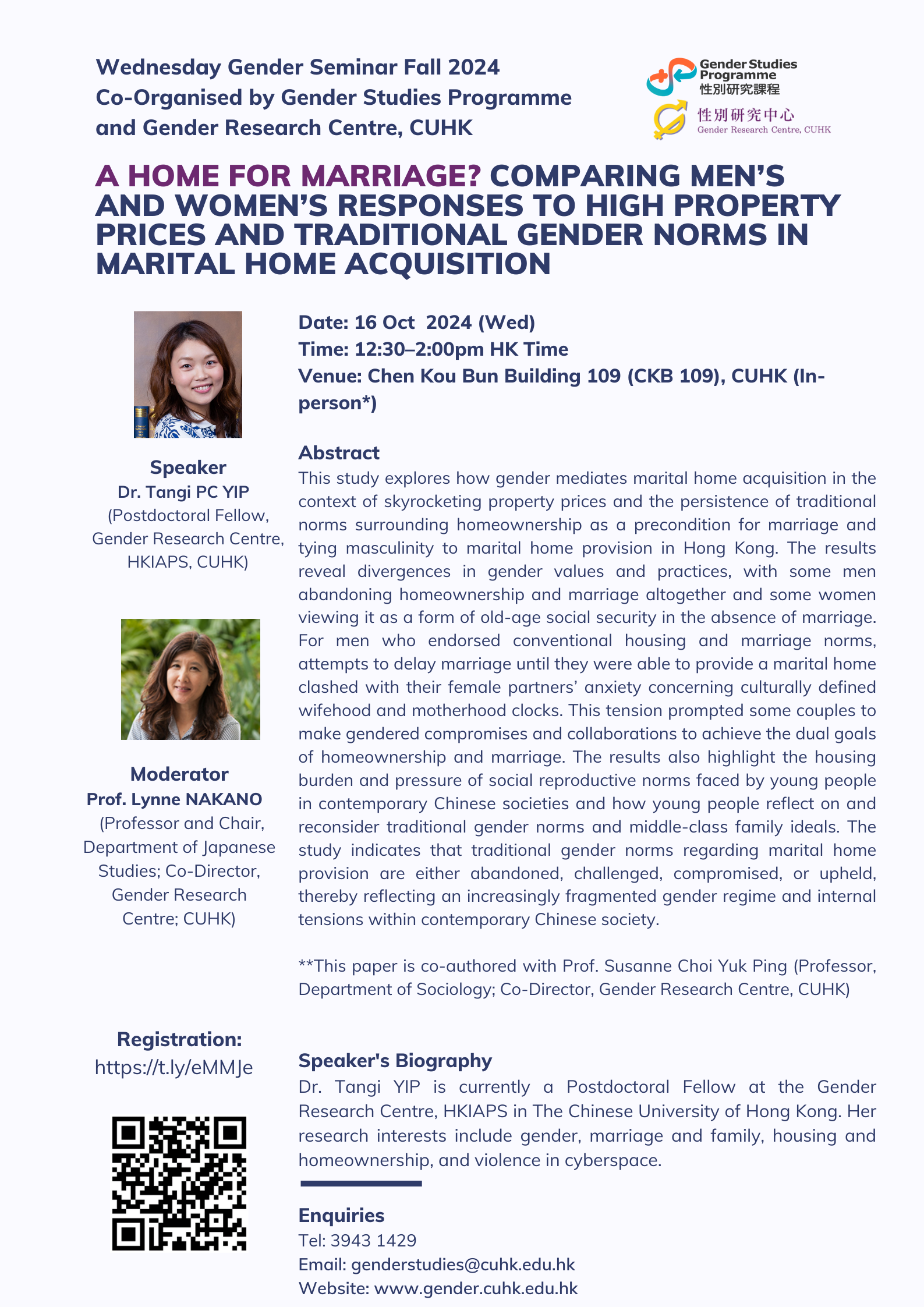 This seminar explores how gender mediates marital home acquisition in the context of skyrocketing property prices and the persistence of traditional norms surrounding homeownership as a precondition for marriage and the tying of masculinity to the provision of a marital home in Hong Kong.
This seminar explores how gender mediates marital home acquisition in the context of skyrocketing property prices and the persistence of traditional norms surrounding homeownership as a precondition for marriage and the tying of masculinity to the provision of a marital home in Hong Kong.The results reveal divergences in gender values and practices, with some men abandoning homeownership and marriage altogether and some women viewing it as a form of old-age social security in the absence of marriage. For men who endorsed conventional housing and marriage norms, attempts to delay marriage until they were able to provide a marital home clashed with their female partners’ anxiety concerning culturally defined wifehood and motherhood clocks. This tension prompted some couples to make gendered compromises and collaborations to achieve the dual goals of homeownership and marriage. The results also highlight the housing burden and pressure of social reproductive norms faced by young people in contemporary Chinese societies, and shed light on how young people are reflecting on and reconsidering traditional gender norms and middle-class family ideals. The study indicates that traditional gender norms regarding marital home provision are variously being abandoned, challenged, compromised, or upheld, thereby reflecting an increasingly fragmented gender regime and internal tensions within contemporary Chinese society. |
|
|
Speakers
Prof. Winnie So |
Professor, The Nethersole School of Nursing, Faculty of Medicine, CUHK |
|
Dr Erica Liebermann
|
Assistant Professor, College of Nursing, University of Rhode Island
|
|
Prof. Nirmala Bhoo-Pathy
|
Professor of (Clinical) Epidemiology, Department of Social and Preventive Medicine, Faculty of Medicine, Universiti Malaya |
|
Co-organizer
Gender Studies Programme, CUHK |
|
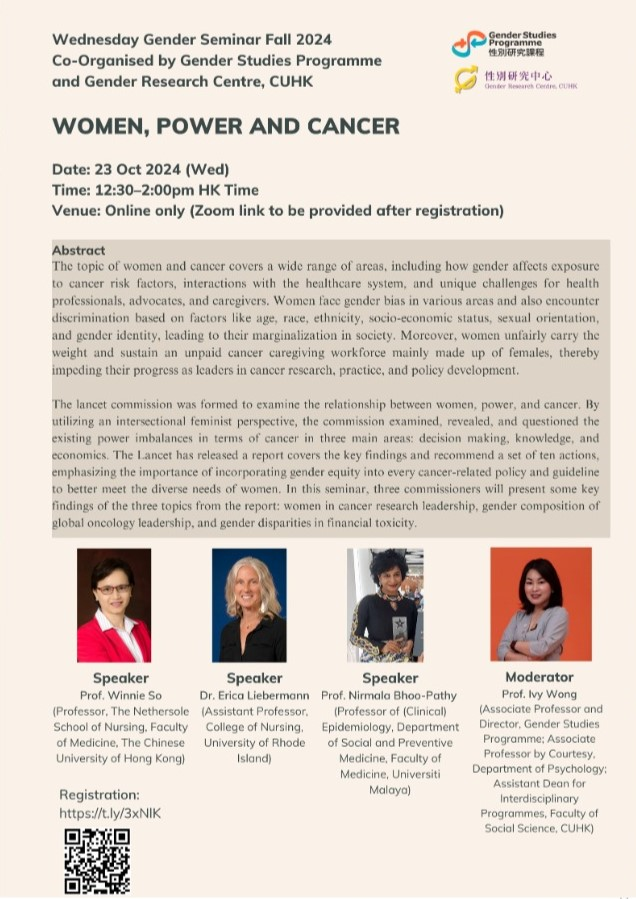 The topic of women and cancer covers a wide range of areas,
including how gender affects exposure to cancer risk factors,
interactions with the healthcare system, and unique challenges for health professionals, advocates, and caregivers.
Women face gender bias in various areas and also encounter discrimination based on factors such as age,
race, ethnicity, socio-economic status, sexual orientation, and gender identity,
leading to their marginalization in society. Moreover, women unfairly carry the weight of caregiving,
as they comprise the bulk of an unpaid cancer caregiving workforce,
thereby impeding their progress as leaders in cancer research, practice, and policy development.
The topic of women and cancer covers a wide range of areas,
including how gender affects exposure to cancer risk factors,
interactions with the healthcare system, and unique challenges for health professionals, advocates, and caregivers.
Women face gender bias in various areas and also encounter discrimination based on factors such as age,
race, ethnicity, socio-economic status, sexual orientation, and gender identity,
leading to their marginalization in society. Moreover, women unfairly carry the weight of caregiving,
as they comprise the bulk of an unpaid cancer caregiving workforce,
thereby impeding their progress as leaders in cancer research, practice, and policy development.The Lancet Commission was formed to examine the relationship between women, power, and cancer. By utilizing an intersectional feminist perspective, the commission examined, revealed, and questioned existing power imbalances relating to cancer in three main areas: decision making, knowledge, and economics. The Lancet has released a report covering the key findings and recommending a set of ten actions. The report emphasizes the importance of incorporating gender equity into every cancer-related policy and guideline to better meet the diverse needs of women. In this seminar, three commissioners will present some key findings on three topics from the report: women in cancer research leadership, the gender composition of global oncology leadership, and gender disparities in financial toxicity. |
|
|
Speaker
Dr Romit Chowdhury |
Assistant Professor, Department of Sociology, Erasmus University Rotterdam |
|
Co-organizer
Gender Studies Programme, CUHK |
|
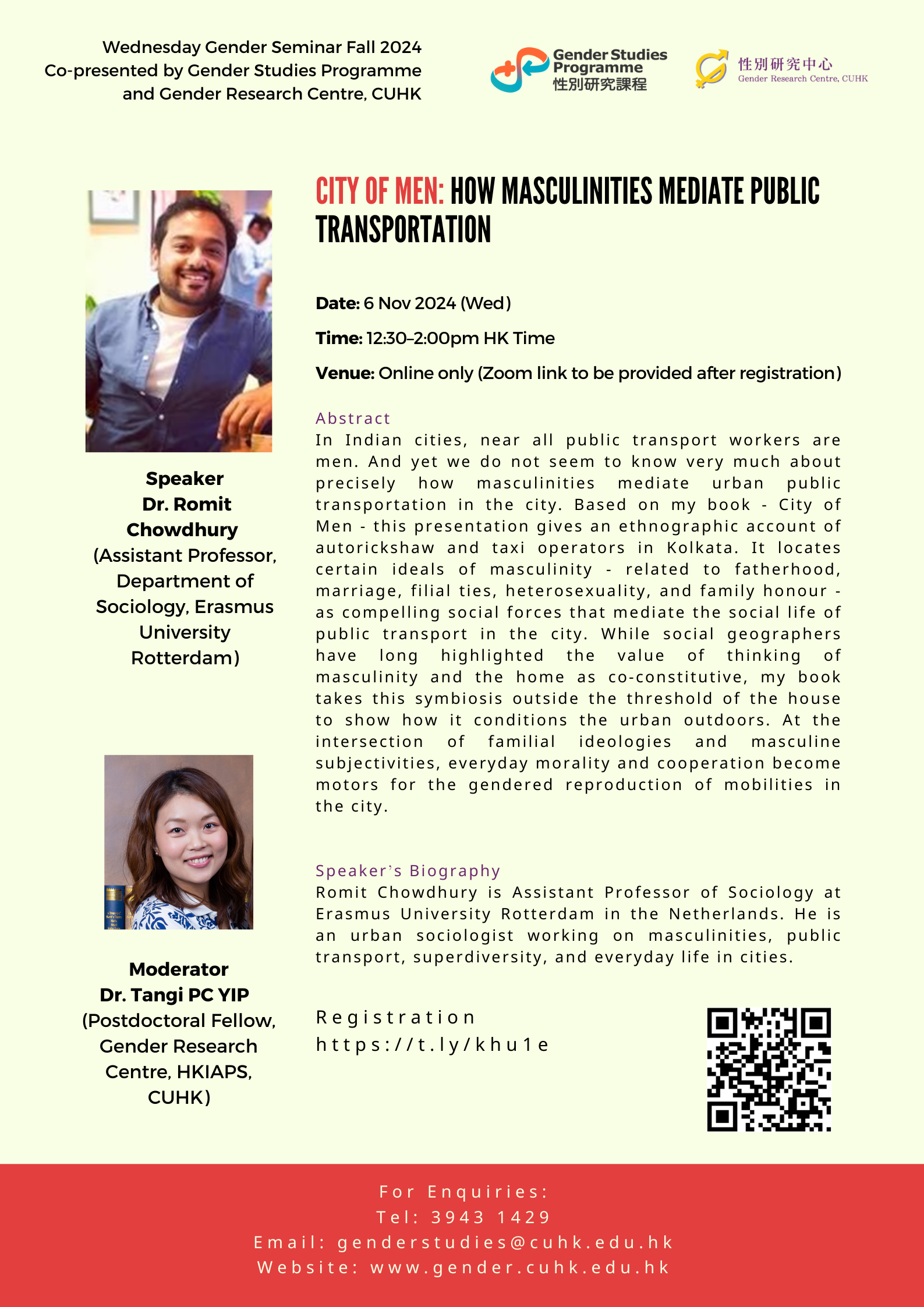 In Indian cities, near all public transport workers are men.
And yet we do not seem to know very much about precisely how masculinities mediate urban public transportation in the city.
Based on the speaker’s book – City of Men – this webinar presents an ethnographic account of autorickshaw and taxi operators in Kolkata.
It locates certain ideals of masculinity – related to fatherhood,
marriage, filial ties, heterosexuality, and family honour – as compelling social forces that mediate the social life of public transport in the city.
In Indian cities, near all public transport workers are men.
And yet we do not seem to know very much about precisely how masculinities mediate urban public transportation in the city.
Based on the speaker’s book – City of Men – this webinar presents an ethnographic account of autorickshaw and taxi operators in Kolkata.
It locates certain ideals of masculinity – related to fatherhood,
marriage, filial ties, heterosexuality, and family honour – as compelling social forces that mediate the social life of public transport in the city.While social geographers have long highlighted the value of thinking of masculinity and the home as co-constitutive, the speaker’s book takes this symbiosis outside the threshold of the house to show how it conditions the urban outdoors. At the intersection of familial ideologies and masculine subjectivities, everyday morality and cooperation become motors for the gendered reproduction of mobilities in the city. |
|
|
Facilitating a Collaborative Future:
How Can Nonviolent Communication Help Local NGOs in Catering to Connection and Efficiency?
(從拉鋸戰到團隊合作:用非暴力溝通轉變民間團體的決策過程)
12:30–14:00 | 13 November 2024 | Room 109, Chen Kou Bun Building, CUHK |
|
|
Speaker
Dr Joseph Cho |
Lecturer, Gender Studies Programme, CUHK |
|
Co-organizer
Gender Studies Programme, CUHK |
|
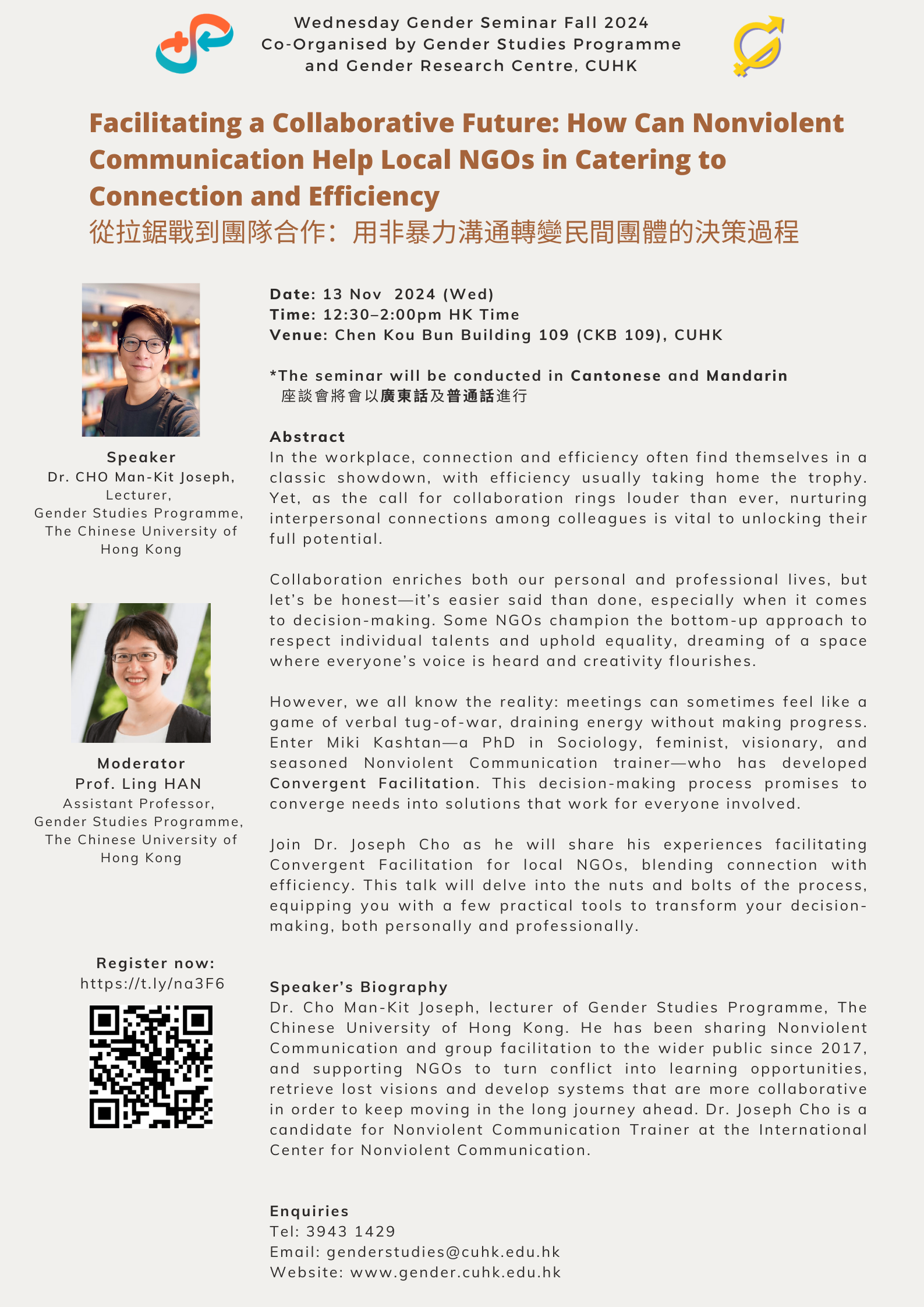 In the workplace, connection and efficiency often find themselves in a classic showdown,
with efficiency usually taking home the trophy.
Yet, as the call for collaboration rings louder than ever,
nurturing interpersonal connections among colleagues is vital to unlocking their full potential.
In the workplace, connection and efficiency often find themselves in a classic showdown,
with efficiency usually taking home the trophy.
Yet, as the call for collaboration rings louder than ever,
nurturing interpersonal connections among colleagues is vital to unlocking their full potential.Collaboration enriches both our personal and professional lives, but let’s be honest – it’s easier said than done, especially when it comes to decision-making. Some NGOs champion the bottom-up approach to respect individual talents and uphold equality, dreaming of a space where everyone’s voice is heard and creativity flourishes. However, we all know the reality: Meetings can sometimes feel like a game of verbal tug-of-war, draining energy without making progress. Enter Miki Kashtan – a PhD in Sociology, feminist, visionary, and seasoned Nonviolent Communication trainer – who has developed Convergent Facilitation. This decision-making process promises to converge needs into solutions that work for everyone involved. Dr Joseph Cho shared his experiences in facilitating Convergent Facilitation for local NGOs, blending connection with efficiency. This talk delved into the nuts and bolts of the process, equipping audience with a few practical tools to transform their decision-making, both personally and professionally. |
|
|
Reproductive Decisions and Work-Family Dynamics of Women Under the Transformation of Family Planning Policies
12:30–14:00 | 19 February 2025 | Online |
|
|
Speaker
Prof. Yang Shen |
Associate Professor and PhD supervisor, School of International and Public Affairs, Shanghai Jiao Tong University, China |
|
Co-organizer
Gender Studies Programme, CUHK |
|
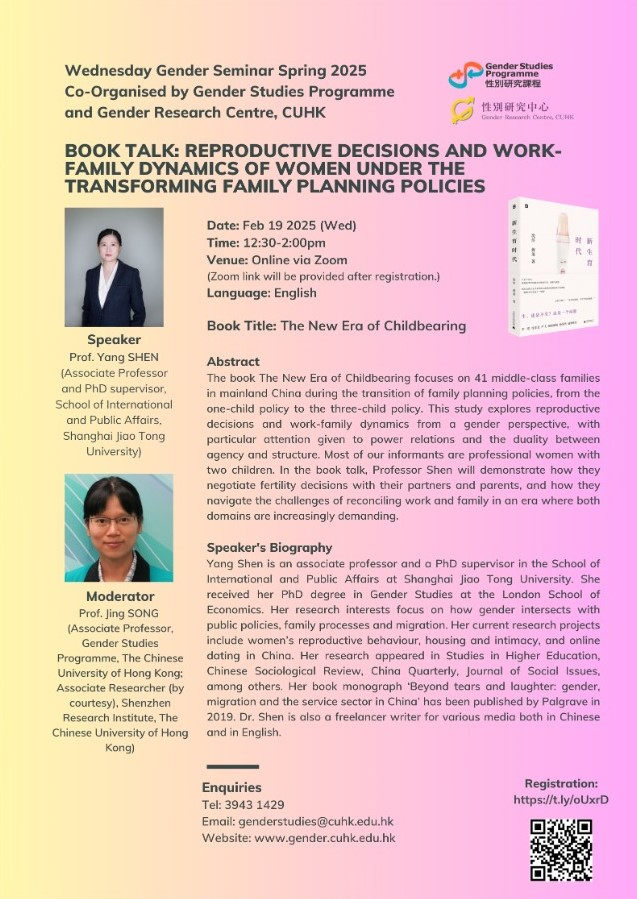 The book The New Era of Childbearing focuses on 41 middle-class families in mainland China during the transition in family-planning policies,
from the one-child policy to the three-child policy.
This book talk explores reproductive decisions and work-family dynamics from a gender perspective,
paying particular attention to power relations and the duality between agency and structure.
Most of the book’s informants are professional women with two children.
The book The New Era of Childbearing focuses on 41 middle-class families in mainland China during the transition in family-planning policies,
from the one-child policy to the three-child policy.
This book talk explores reproductive decisions and work-family dynamics from a gender perspective,
paying particular attention to power relations and the duality between agency and structure.
Most of the book’s informants are professional women with two children. In this talk, Prof. Shen demonstrated how they negotiate fertility decisions with their partners and parents, and how they navigate the challenges of reconciling work and family in an era when both domains are increasingly demanding. |
|
|
Gendered Parenting and Intergenerational Collaboration on Childcare for Two Children in Urban Chinese Families
12:30–14:00 | 26 March 2025 | Rm G01, G/F, Hui Yeung Shing Building, CUHK |
|
|
Speaker
Prof. Yinni Peng |
Associate Professor at the Department of Sociology, Hong Kong Baptist University |
|
Co-organizer
Gender Studies Programme, CUHK |
|
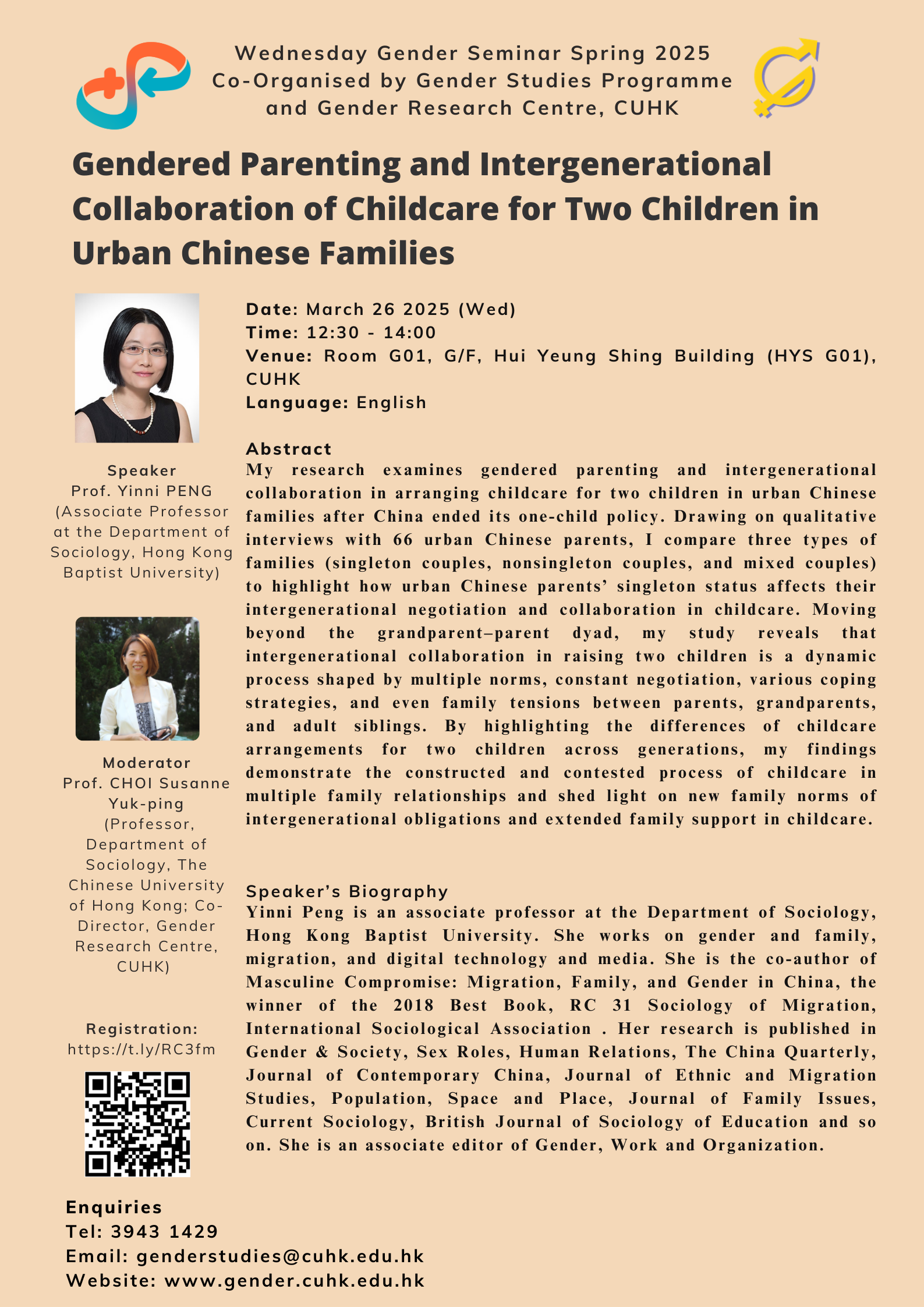 Prof. Peng’s research examines gendered parenting and intergenerational collaboration in arranging for childcare for two children in urban Chinese families after the end of China’s one-child policy.
Drawing on qualitative interviews with 66 urban Chinese parents,
Prof. Peng compared three types of families (singleton couples, non-singleton couples, and mixed couples)
to highlight how urban Chinese parents’ singleton status affects their intergenerational negotiation and collaboration in childcare.
Moving beyond the grandparent–parent dyad,
Prof. Peng’s study revealed that intergenerational collaboration in raising two children is a dynamic process shaped by multiple norms,
constant negotiation, various coping strategies, and even family tensions between parents, grandparents, and adult siblings.
Prof. Peng’s research examines gendered parenting and intergenerational collaboration in arranging for childcare for two children in urban Chinese families after the end of China’s one-child policy.
Drawing on qualitative interviews with 66 urban Chinese parents,
Prof. Peng compared three types of families (singleton couples, non-singleton couples, and mixed couples)
to highlight how urban Chinese parents’ singleton status affects their intergenerational negotiation and collaboration in childcare.
Moving beyond the grandparent–parent dyad,
Prof. Peng’s study revealed that intergenerational collaboration in raising two children is a dynamic process shaped by multiple norms,
constant negotiation, various coping strategies, and even family tensions between parents, grandparents, and adult siblings. By highlighting the differences in childcare arrangements for two children across generations, Prof. Peng’s findings demonstrated the constructed and contested process of providing childcare and its impact on multiple family relationships, and shed light on new family norms of intergenerational obligations and extended family support in the provision of childcare. |
|
|
Speaker
Prof. Xianchun Zhang |
Associate Professor, School of Public Affairs, Zhejiang University, China |
|
Co-organizer
Department of Geography and Resource Management, CUHK |
|
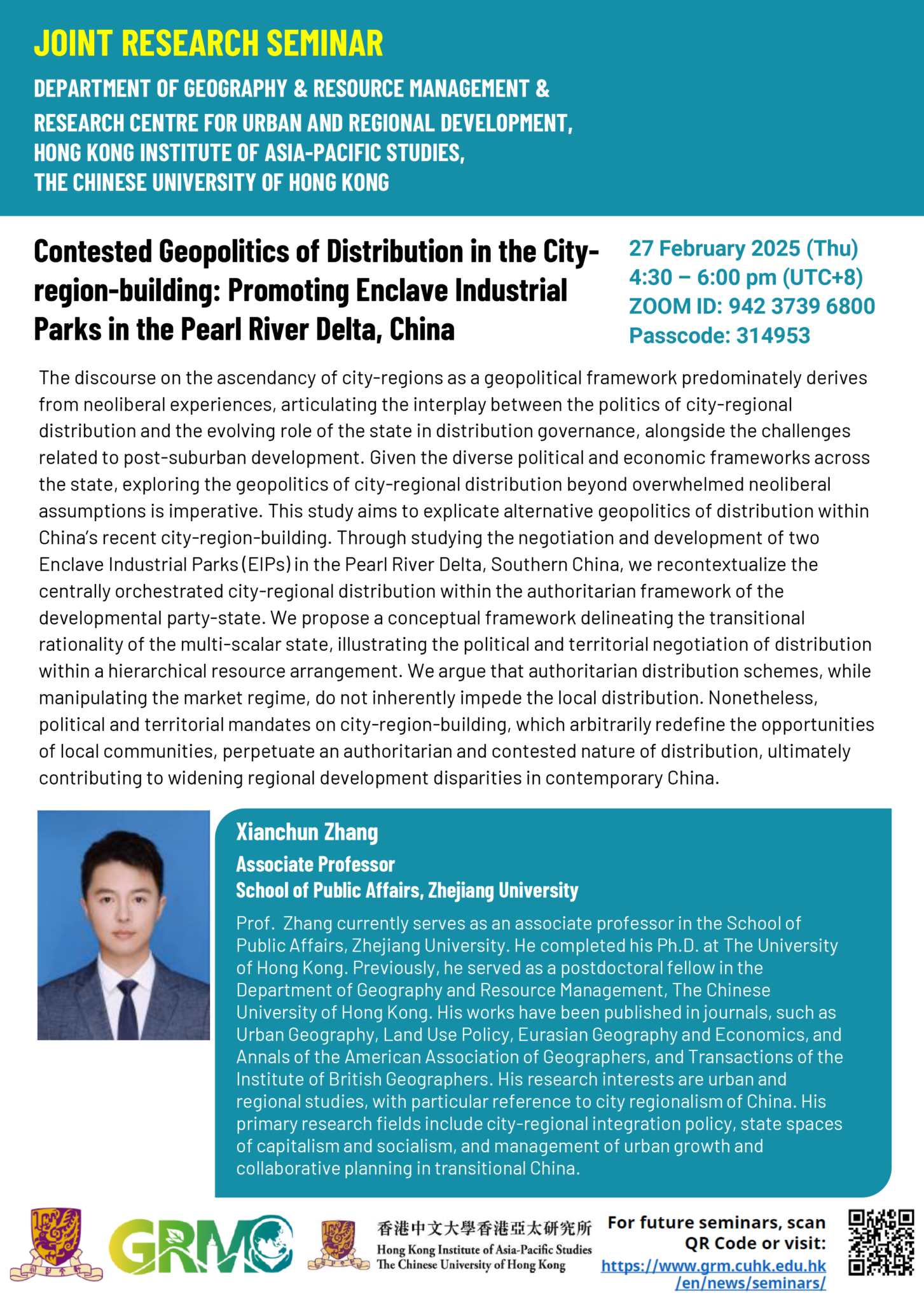 The discourse on the ascendancy of city-regions as a geopolitical framework predominately derives from neoliberal experiences.
It is an articulation of the interplay between the politics of city-regional distribution and the evolving role of the state in distribution governance,
alongside the challenges related to post-suburban development.
Given the diverse political and economic frameworks across the state,
it is imperative to explore the geopolitics of city-regional distribution beyond neoliberal assumptions.
The discourse on the ascendancy of city-regions as a geopolitical framework predominately derives from neoliberal experiences.
It is an articulation of the interplay between the politics of city-regional distribution and the evolving role of the state in distribution governance,
alongside the challenges related to post-suburban development.
Given the diverse political and economic frameworks across the state,
it is imperative to explore the geopolitics of city-regional distribution beyond neoliberal assumptions.This seminar aims to explicate alternative geopolitics of distribution within China’s recent city-region-building efforts. Through studying the negotiation and development of two Enclave Industrial Parks (EIPs) in the Pearl River Delta, Southern China, we recontextualize the centrally orchestrated city-regional distribution within the authoritarian framework of the developmental party-state. Prof. Zhang and his team proposed a conceptual framework delineating the transitional rationality of the multi-scalar state, and illustrated the political and territorial negotiation of distribution within a hierarchical resource arrangement. They argued that authoritarian distribution schemes, while manipulating the market regime, do not inherently impede local distribution. Nonetheless, political and territorial mandates on city-region-building, which arbitrarily redefine the opportunities of local communities, perpetuate an authoritarian and contested nature of distribution, ultimately contributing to widening disparities in regional development in contemporary China. |
|
|
Age-friendly Neighbourhood Environment, Health and Well-being Among Older Adults in China: Evidence from Longitudinal Studies 16:30–18:00 | 17 March 2025 | Room 221, Chen Kou Bun Building, CUHK
|
Speaker
Prof. Ye Liu
|
Professor, School of Geography and Planning, Sun Yat-sen University, China
|
Co-organizer
Department of Geography and Resource Management, CUHK
|
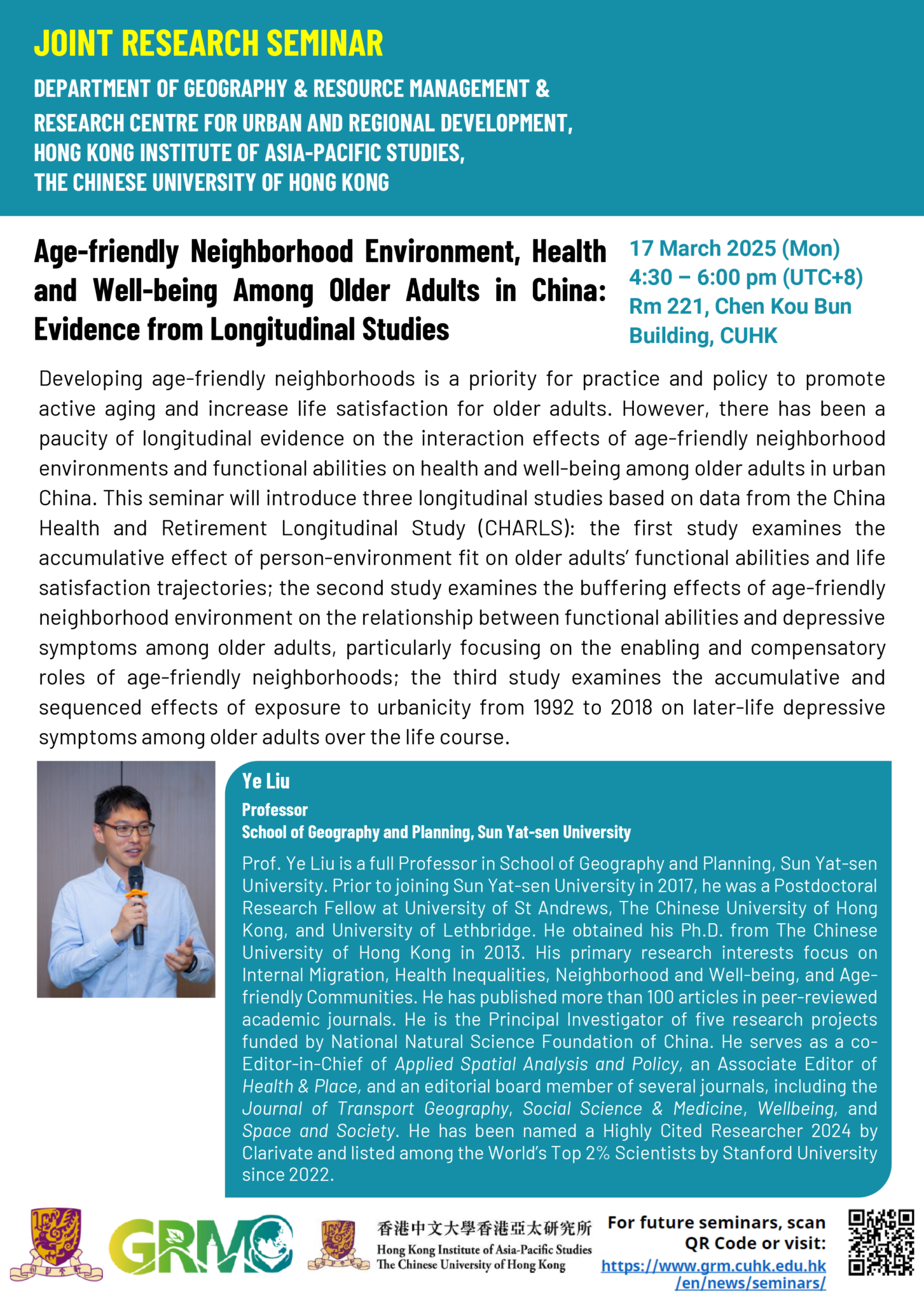 Developing age-friendly neighbourhoods is a priority for practice and policy to promote active ageing and increase the life satisfaction of older adults.
However, there is a paucity of longitudinal evidence on the interaction effects of age-friendly neighbourhood environments and functional abilities on the health and well-being of older adults in urban China.
Developing age-friendly neighbourhoods is a priority for practice and policy to promote active ageing and increase the life satisfaction of older adults.
However, there is a paucity of longitudinal evidence on the interaction effects of age-friendly neighbourhood environments and functional abilities on the health and well-being of older adults in urban China.This seminar will introduce three longitudinal studies based on data from the China Health and Retirement Longitudinal Study (CHARLS): The first study examines the accumulative effect of person-environment fit on the functional abilities and life satisfaction trajectories of older adults; the second study examines the buffering effects of an age-friendly neighbourhood environment on the relationship between functional abilities and depressive symptoms among older adults, focusing particularly on the enabling and compensatory roles of age-friendly neighbourhoods; the third study examines the accumulative and sequenced effects of exposure to urbanicity from 1992 to 2018 on later-life depressive symptoms among older adults over the life course.
| | ||||||
|
Chinese Law Programme
Socialist Modernization After the 3rd Plenum: Issues and Challenges 10:30–12:00 | 17 September 2024 | Room 505, Esther Lee Building, CUHK |
|
|
Speaker
Prof. Larry Catá Backer |
Professor of Law and International Affairs, Pennsylvania State University, U.S. |
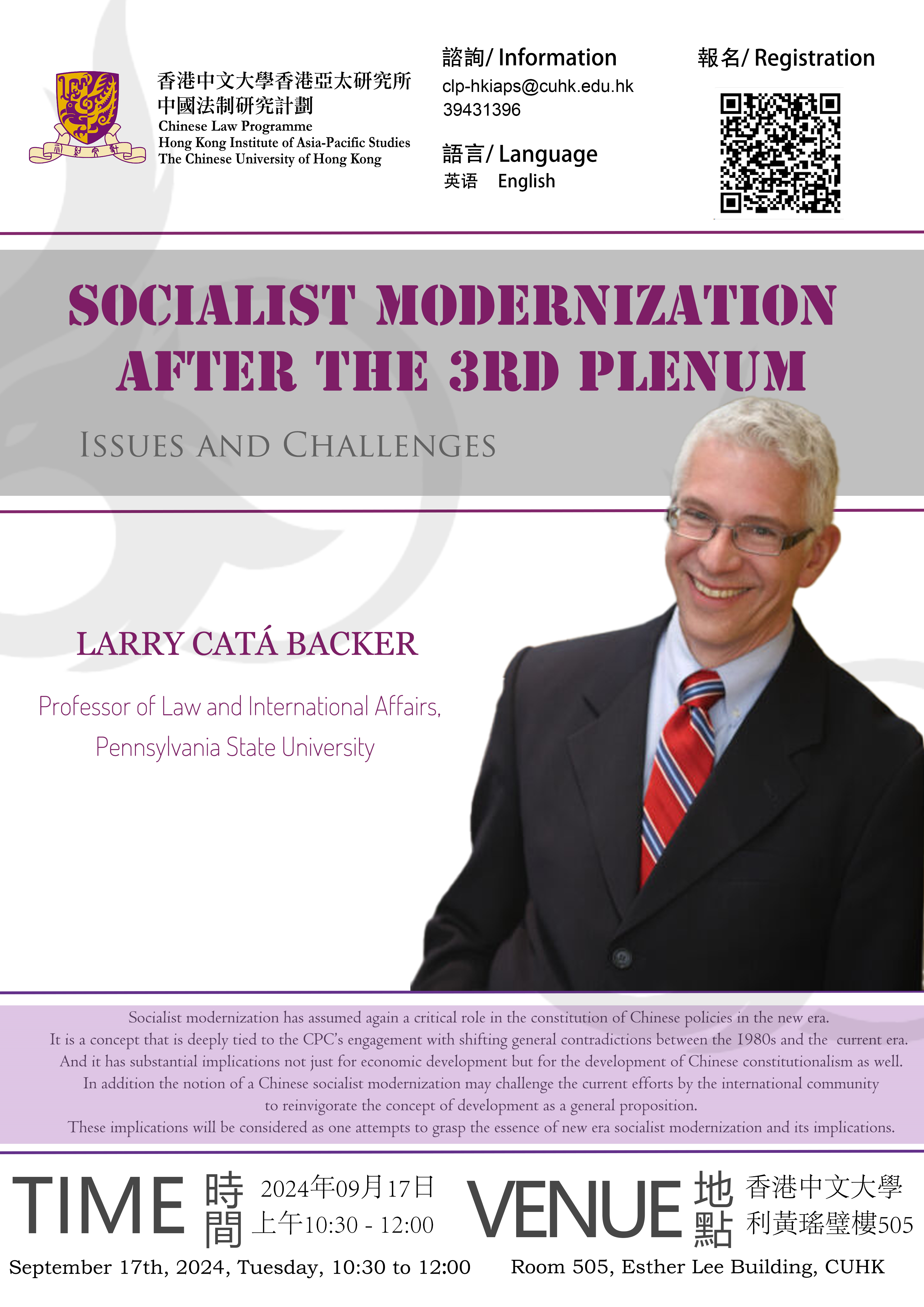 Socialist modernization has assumed again a critical role in the constitution of Chinese policies in the new era.
It is a concept that is deeply tied to the CPC’s engagement with shifting general contradictions between the 1980s and the current era,
and it has substantial implications not just for economic development but for the development of Chinese constitutionalism as well.
In addition, the notion of a Chinese socialist modernization may challenge the current efforts by the international community to reinvigorate the concept of development as a general proposition.
These implications will be considered as one attempts to grasp the essence of new era socialist modernization and its implications.
Socialist modernization has assumed again a critical role in the constitution of Chinese policies in the new era.
It is a concept that is deeply tied to the CPC’s engagement with shifting general contradictions between the 1980s and the current era,
and it has substantial implications not just for economic development but for the development of Chinese constitutionalism as well.
In addition, the notion of a Chinese socialist modernization may challenge the current efforts by the international community to reinvigorate the concept of development as a general proposition.
These implications will be considered as one attempts to grasp the essence of new era socialist modernization and its implications. |
|
|
Harmony and Development:
The 19th Cross-Strait, Guangdong-Hong Kong-Macao Greater Bay Area Civil Law Forum 24–26 October 2024 | Cho Yiu Conference Hall & Main Library Digital Scholarship Lab, CUHK |
|
|
Opening & Closing
Prof. Anthony Y. H. Fung |
Director, Hong Kong Institute of Asia-Pacific Studies |
|
Prof. Liming Wang
|
Vice President, China Law Society
|
|
Prof. Hui Yao
|
Executive Director, Center for Civil and Commercial Law and Science, Renmin University of China |
|
Dr Wei-Ta Pan
|
Former President, Soochow University, Taiwan
|
|
Prof. Ju-Yin Chen
|
Associate Dean and Professor, School of Law, Soochow University, Taiwan
|
|
Prof. Io Cheng Tong
|
Dean and Professor, Faculty of Law, University of Macao
|
|
Plenary Session 1
Dr Horace K. H. Cheung |
Deputy Secretary for Justice, HKSAR Government |
|
Ms Yanli Si
|
Deputy Director General. Research Office of Supreme People’s Court, China
|
|
Plenary Session 2
Prof. Tze-Chien Wang |
Professor Emeritus, College of Law, Taiwan University |
|
Prof. Liming Wang
|
Vice President, China Law Society
|
|
Dr Yeong-Chin Su
|
Former Dean and Professor, College of Law, Chengchi University, Taiwan
|
|
Plenary Session 3
Prof. Jianyuan Cui |
Professor, School of Law, Tsinghua University, China |
|
Mr Jinliang Ma
|
Deputy Chief Judge, Second Court of Civil Trial, Supreme People’s Court, China |
|
Mr Enzheng Li
|
Director, Civil Law Office, Legislative Affairs Commission of the Standing Committee of the National People’s Congress, China |
|
Prof. Fei Yu
|
Dean, Civil, Commercial and Economic Law School, China University of Political Science and Law |
|
Plenary Session 4
Mr Anthony Neoh |
Former Chairman, Securities and Futures Commission, Hong Kong |
|
Prof. Kaixiang Liu
|
Professor, Peking University Law School, China
|
|
Prof. Shiyang Wen
|
Professor, School of Law, Wuhan University, China
|
|
Prof. Gung-Yeu Jeng
|
Professor, School of Law, Soochow University, Taiwan
|
|
Plenary Session 5
Mr Zhenyuan Ouyang |
President, King & Wood Mallesons Legal Research Institute, China |
|
Prof. Io Cheng Tong
|
Dean and Professor, Faculty of Law, University of Macao
|
|
Dr Jason X. Si
|
Director, Tencent Research Institute, China
|
|
Prof. Pingxue Zou
|
Director and Professor, Center for Basic Laws of Hong Kong and Macao Special Administrative Regions, Shenzhen University, China |
|
Moderators
Prof. Chao Xi |
Dean and Professor, Faculty of Law, CUHK; Director, Chinese Law Programme, HKIAPS |
|
Mr Samuel K. Y. Chan
|
Chairman, Competition Commission (Hong Kong) |
|
Prof. Qiping Tan
|
School of Civil and Commercial Law, Southwest University of Political Science and Law, China |
|
Prof. Chien-Wei Wang
|
Professor, College of Law, Chengchi University, Taiwan |
|
Prof. Xin Zhou
|
Professor, School of Law, Guangdong University of Foreign Studies, China |
|
Prof. Hui Yao
|
Executive Director, Center for Civil and Commercial Law and Science, Renmin University of China |
|
Co-organizers
Renmin University of China China Law Society’s Civil Law Research Association Soochow University, Taiwan |
|
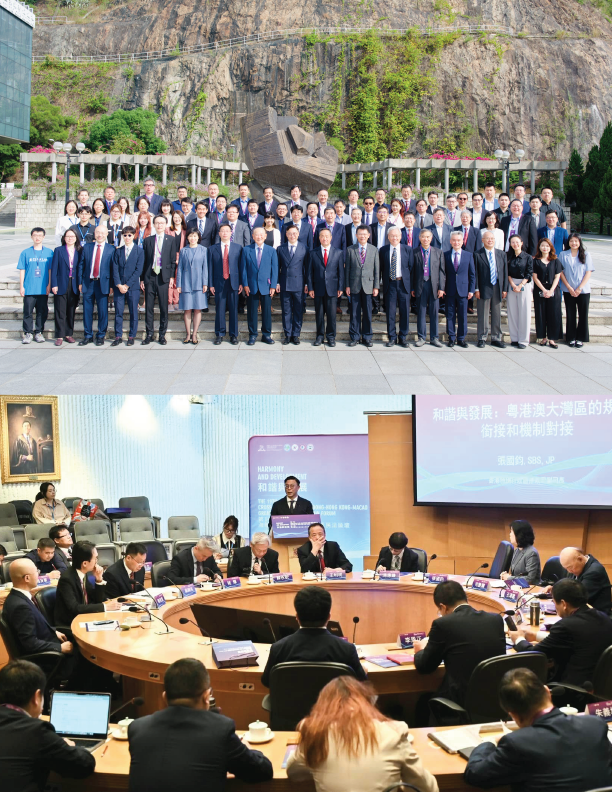 The forum served as a premier academic platform to promote stronger research and educational exchanges amongst members of the Beijing-Hong Kong Universities Alliance.
Seven alliance members were closed involved,
including Renmin University, Tsinghua University, Peking University,
Beijing Institute of Technology, The Chinese University of Hong Kong,
University of Hong Kong, and City University of Hong Kong.
It also involved leading scholars from the Greater Bay Area and Taiwan.
The forum served as a premier academic platform to promote stronger research and educational exchanges amongst members of the Beijing-Hong Kong Universities Alliance.
Seven alliance members were closed involved,
including Renmin University, Tsinghua University, Peking University,
Beijing Institute of Technology, The Chinese University of Hong Kong,
University of Hong Kong, and City University of Hong Kong.
It also involved leading scholars from the Greater Bay Area and Taiwan.This forum provided an opportunity for Hong Kong students to engage in exchanges with leading scholars from members of the Beijing-Hong Kong Universities Alliance. Additionally, the forum was participated by senior lawyers, judges, officials from relevant government departments, as well as representatives from the legislative bodies, law associations, and arbitration committees from mainland China, Taiwan, Hong Kong and Macao, either as speakers or attendees. It was also recognized as a Continuing Professional Development Course by The Law Society of Hong Kong. |
|



